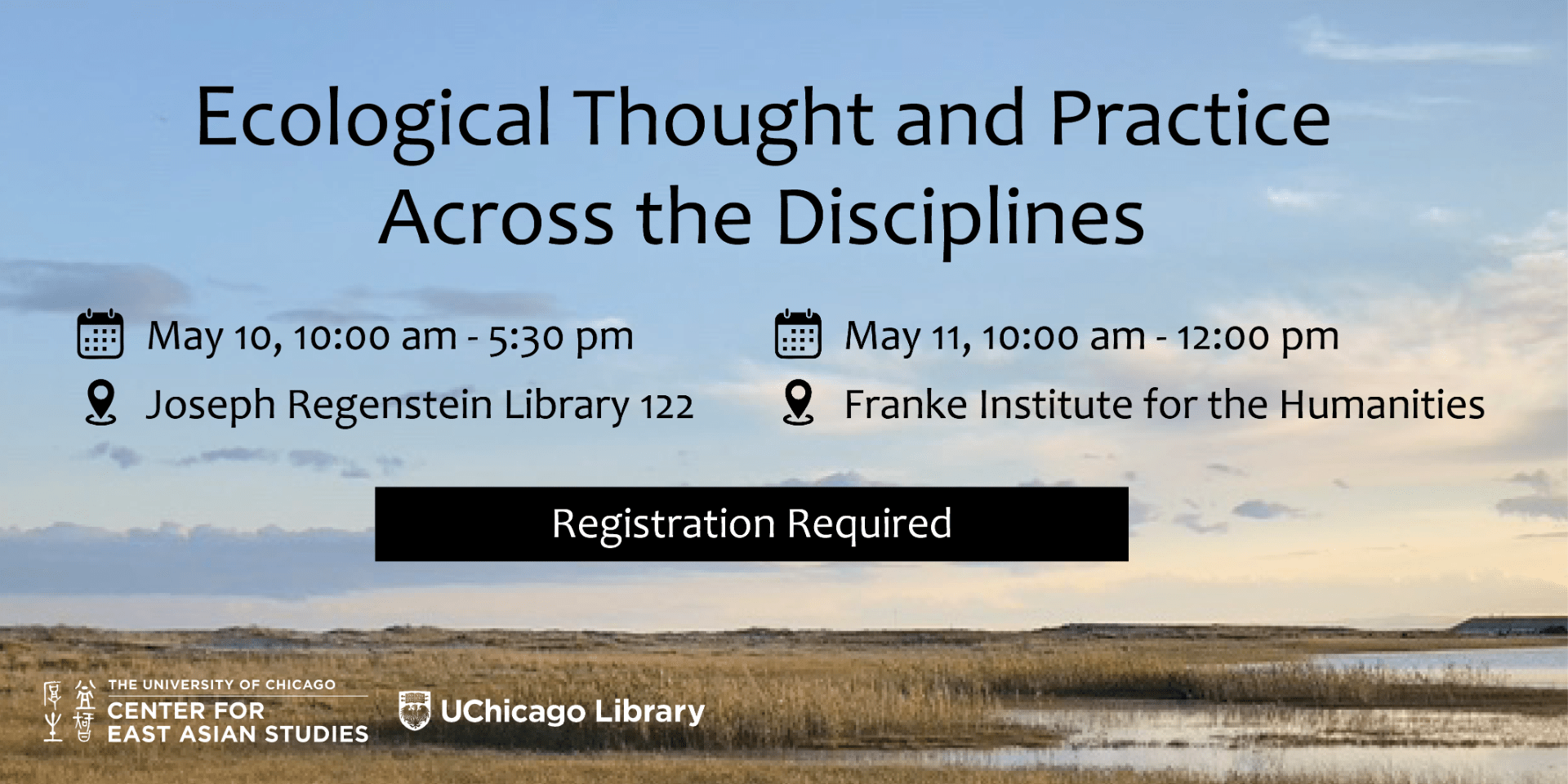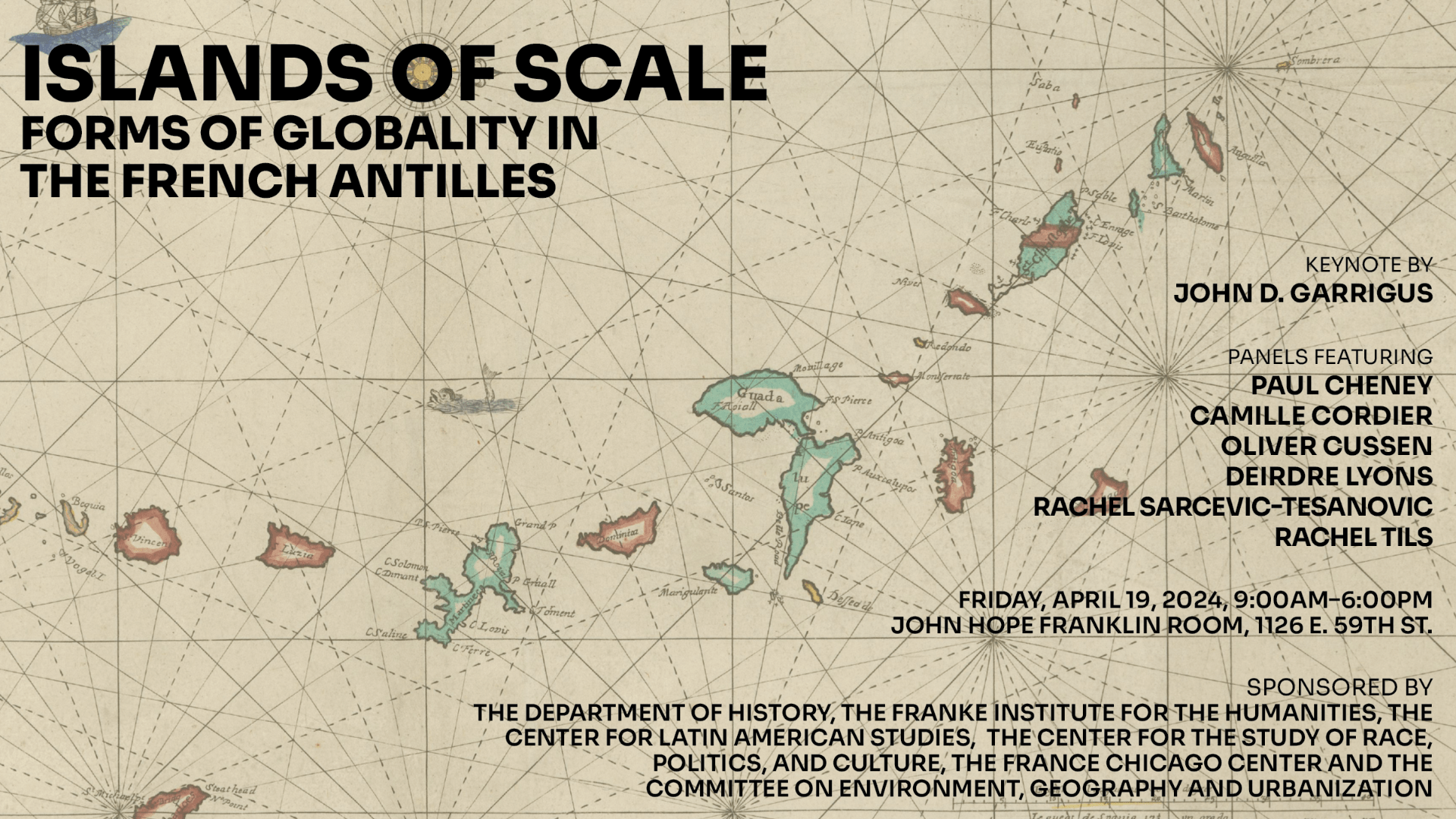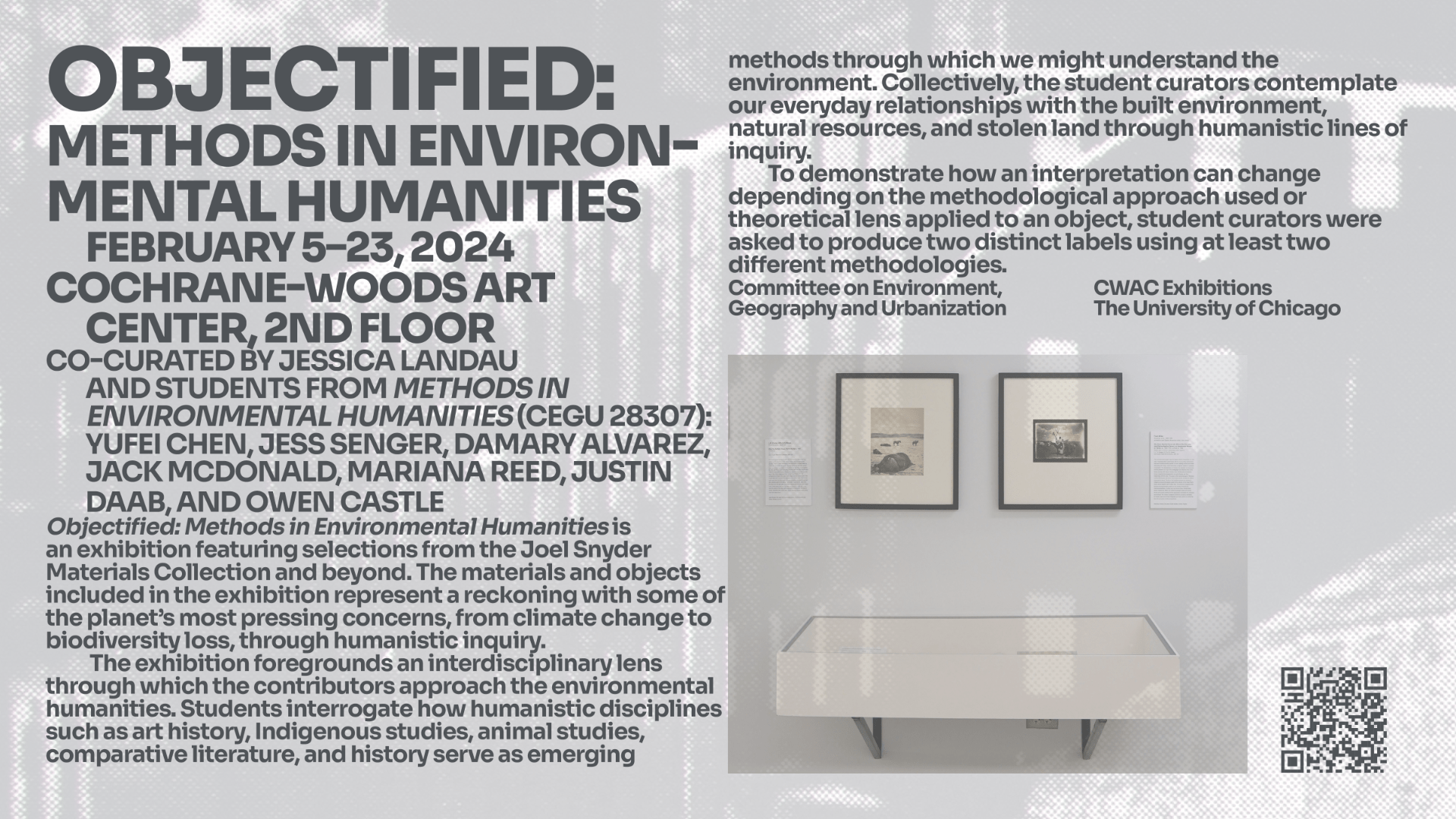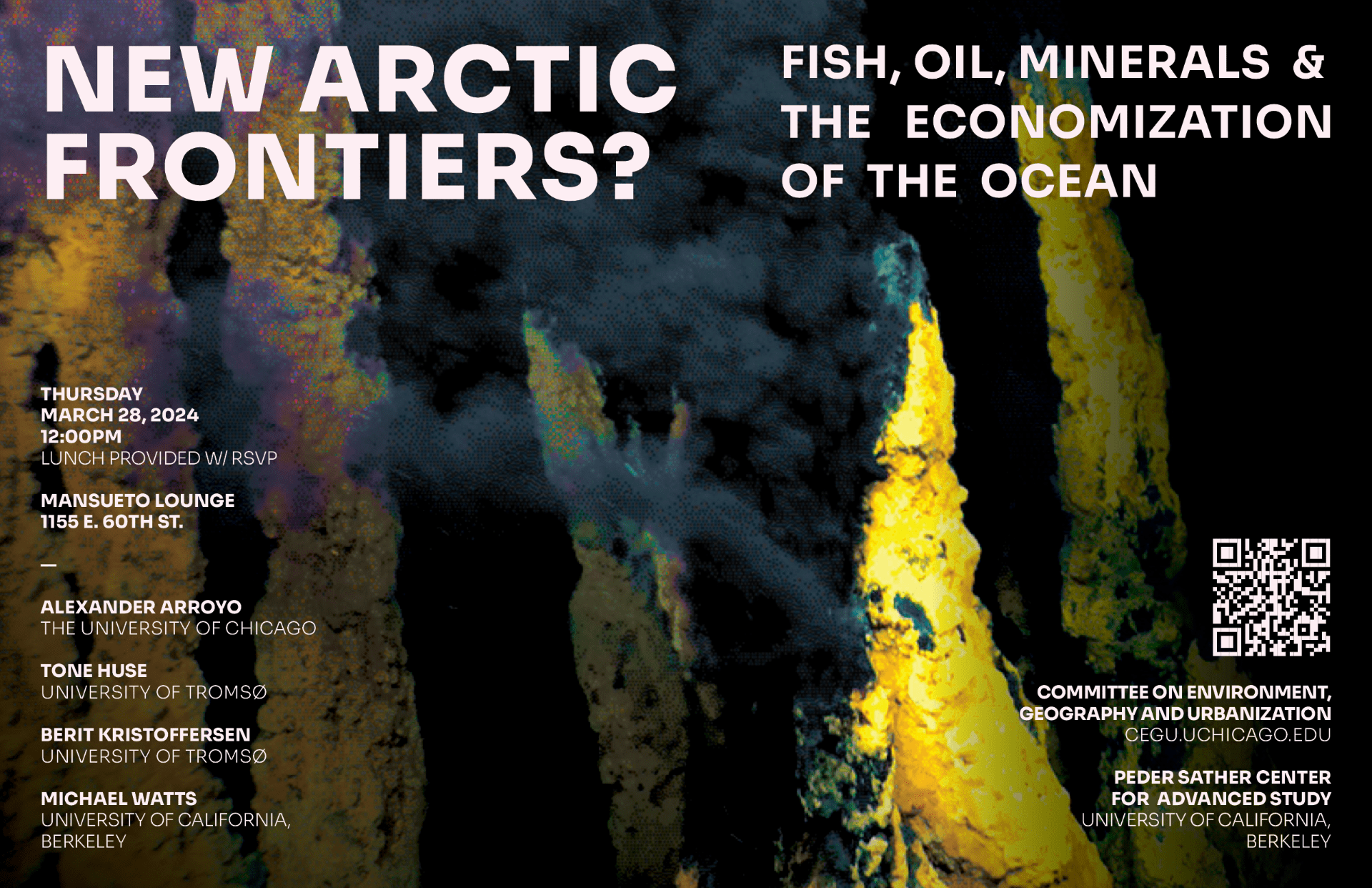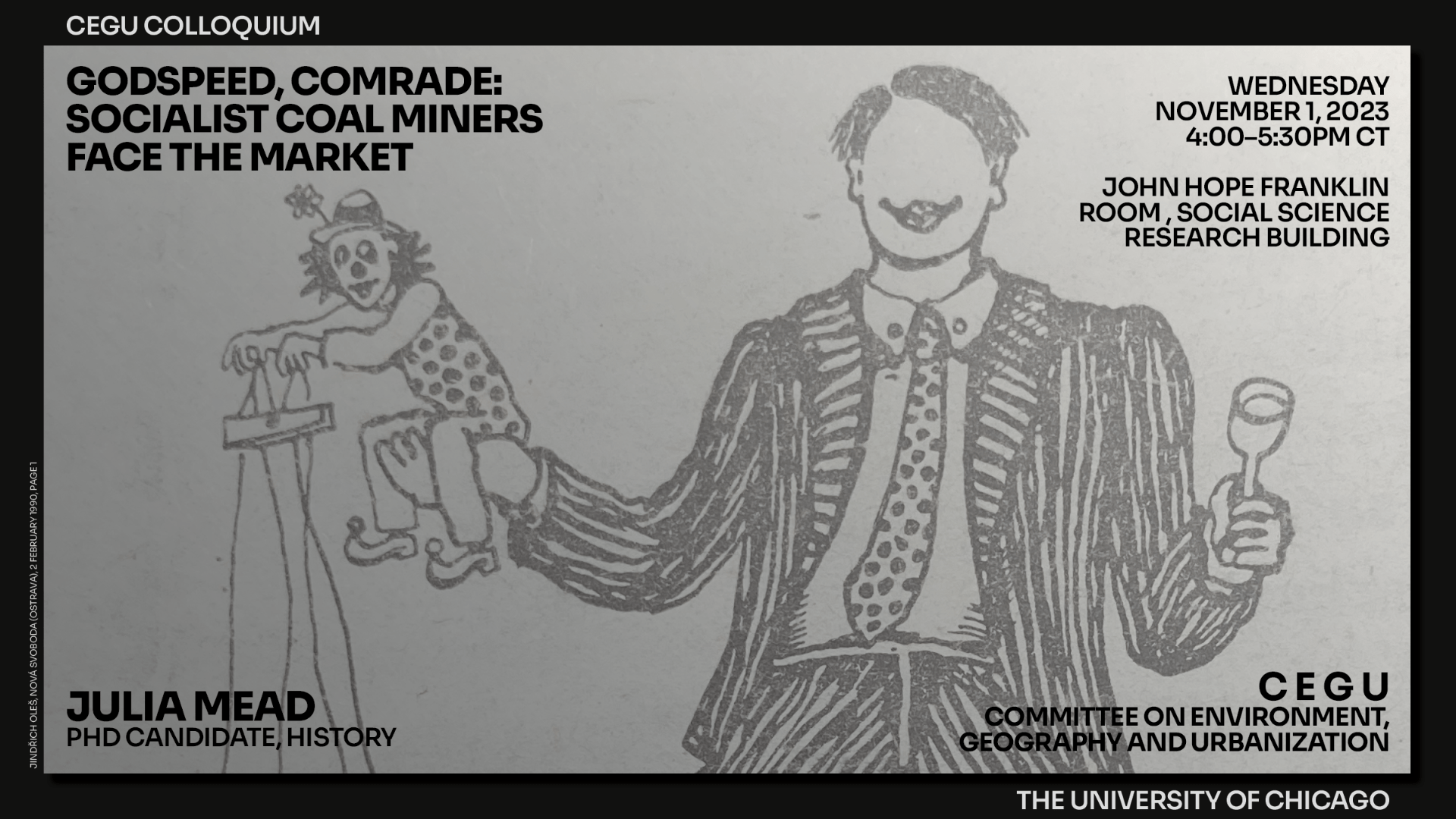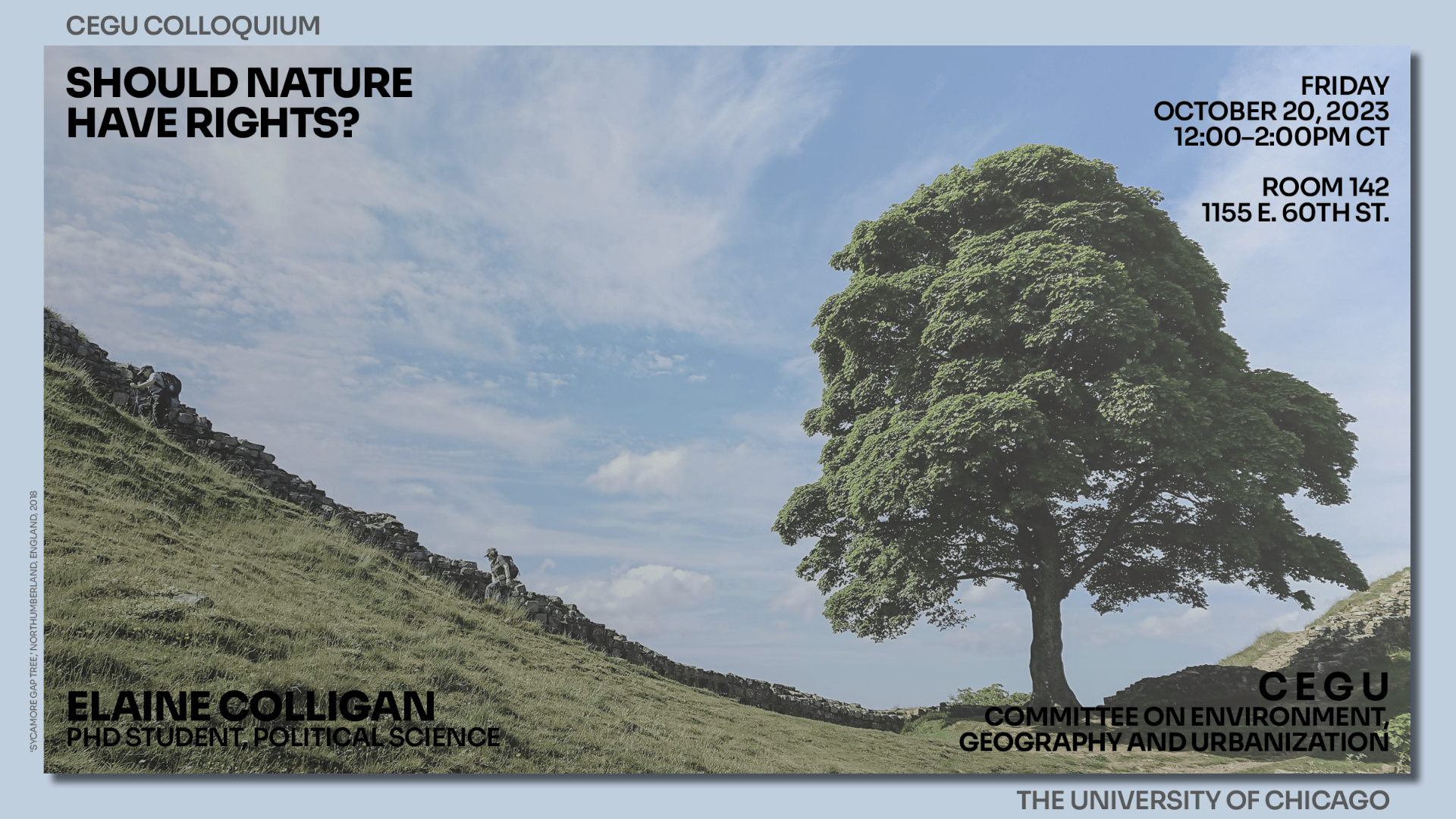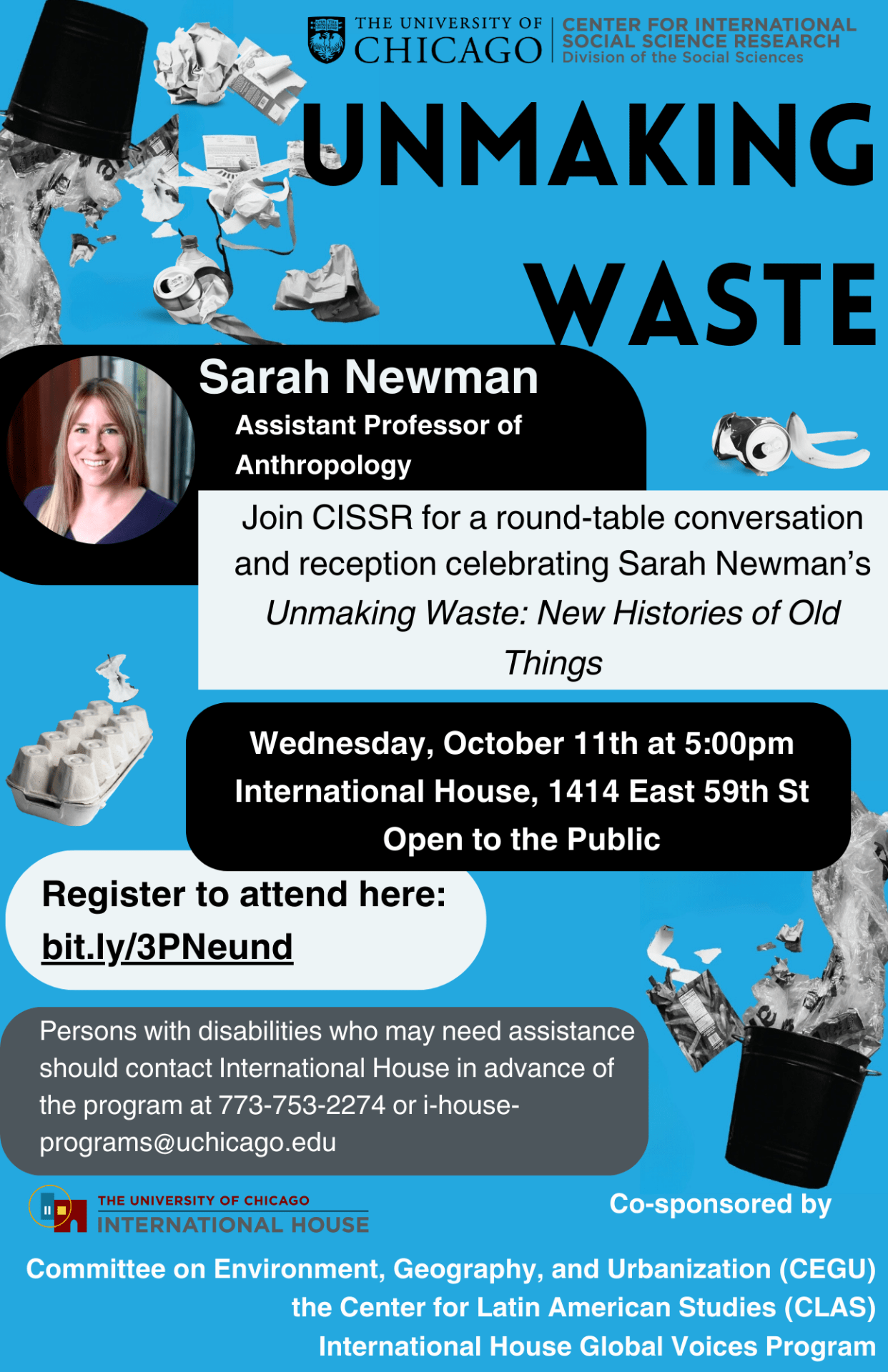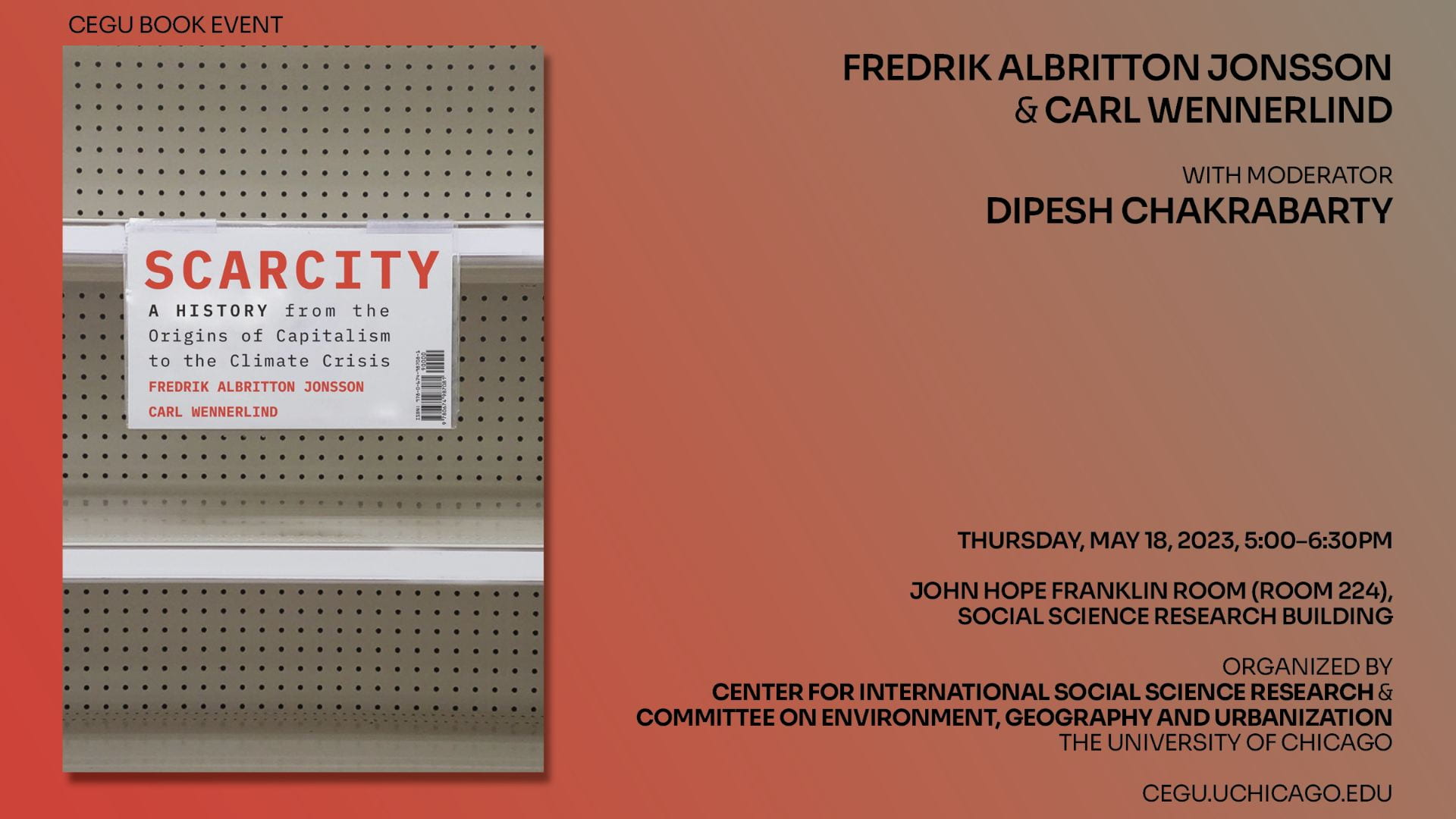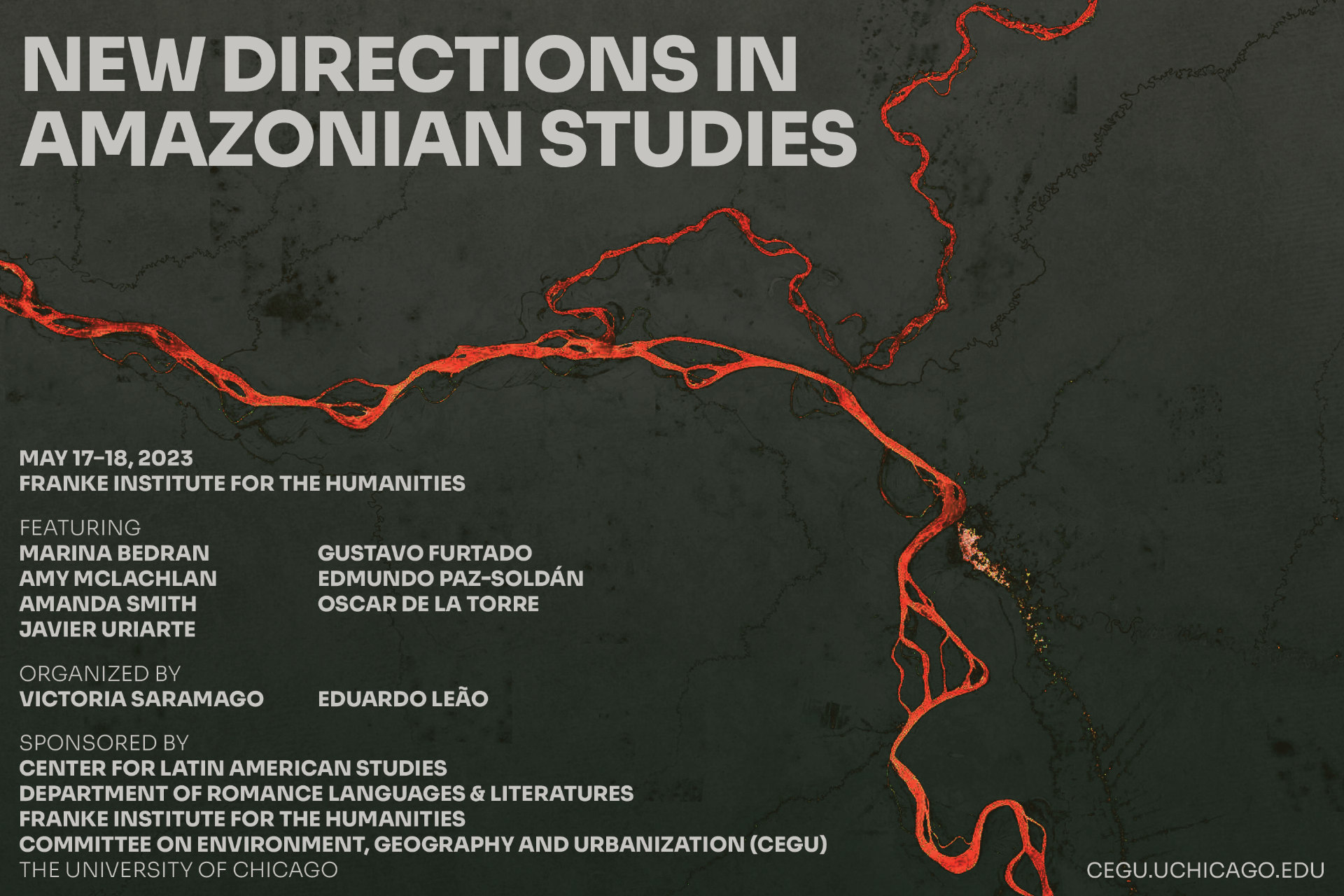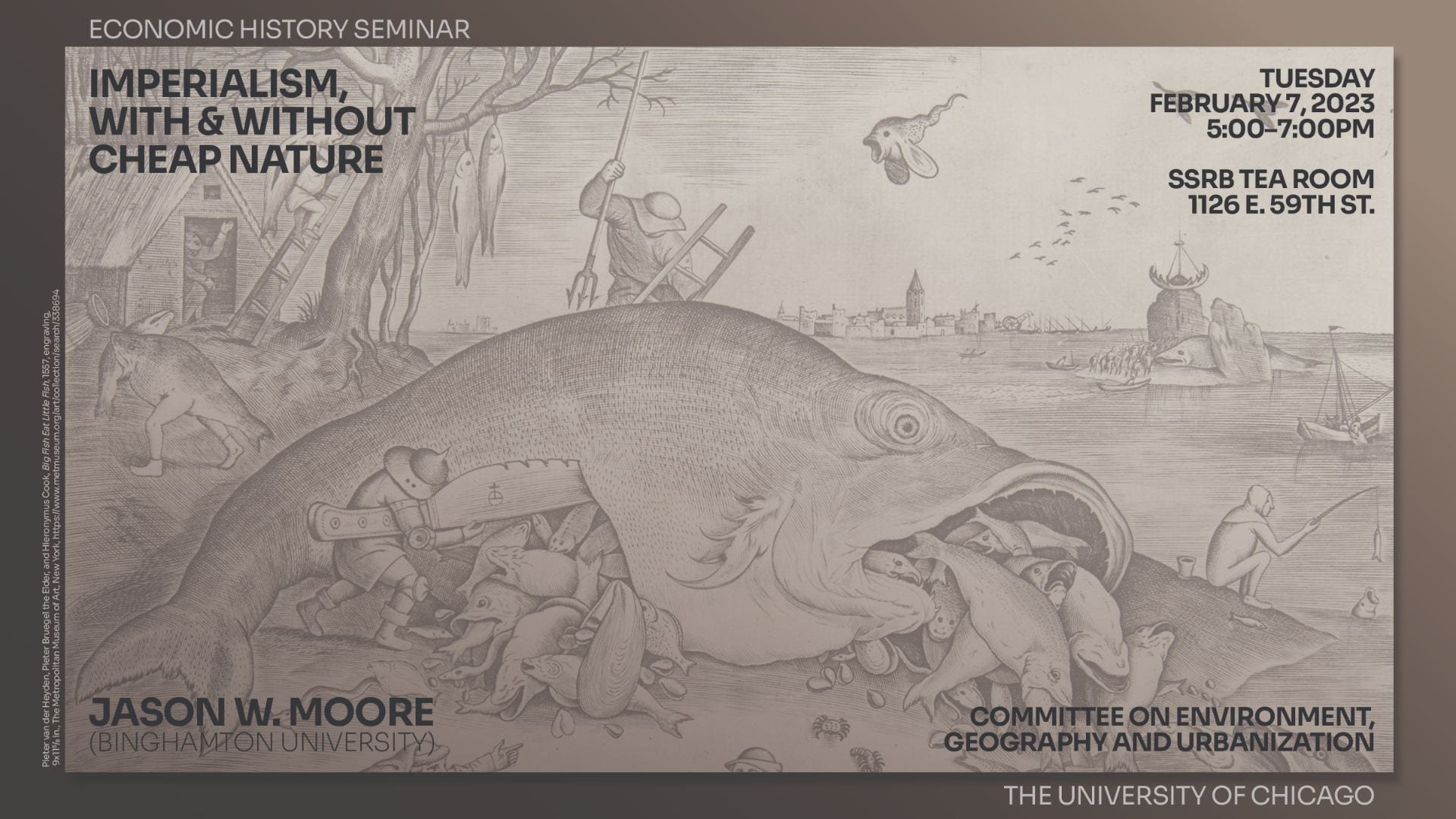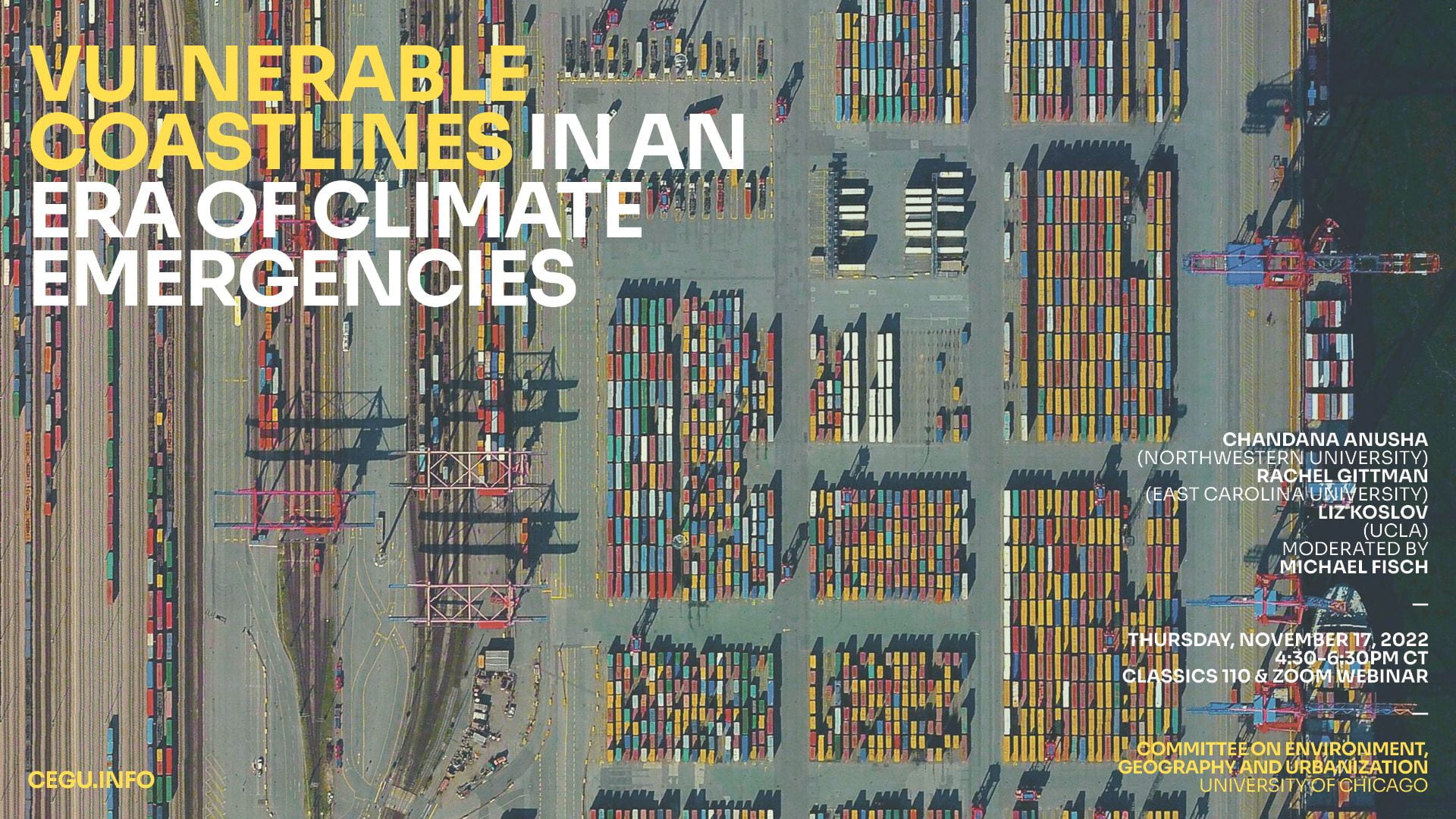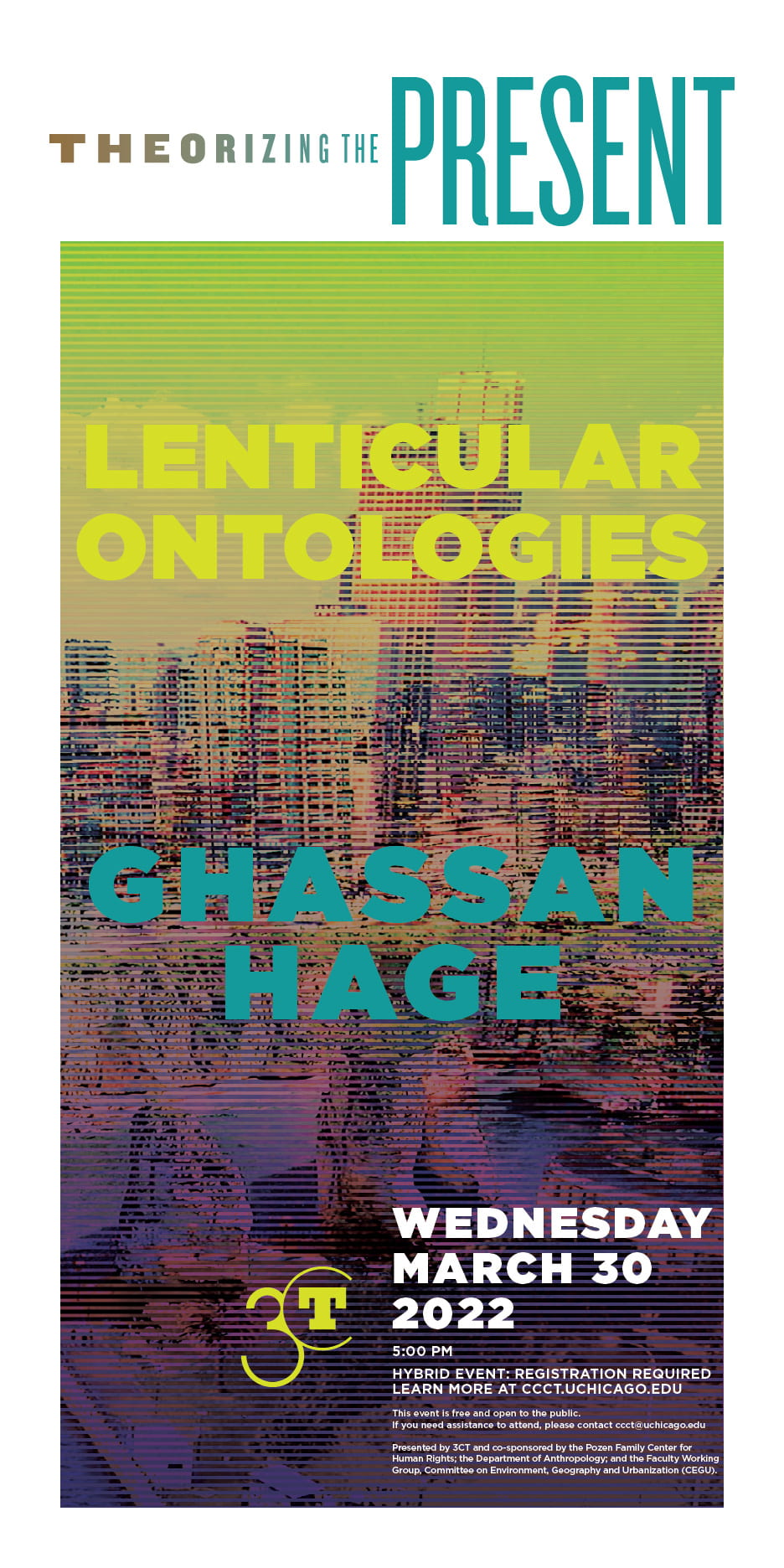Category: All Events, Public Events, Student Events, CEGU Colloquium
PAST EVENTS
Co-sponsored Event
Kohei Saito, University of Tokyo
Wednesday, May 22, 2024, 5:00pm
Room 122, Social Science Reseach Building (1126 E. 59th St.)
More Info
Kohei Saito is associate professor of philosophy at the University of Tokyo and the author of Slow Down: The Degrowth Manifesto (2024), Marx in the Anthropocene (2023), and Karl Marx’s Ecosocialism: Capital, Nature, and the Unfinished Critique of Political Economy (2017).
This event is co-sponsored by CEGU, the Franke Institute for the Humanities, 3CT, the Practical Philosophy Workshop, the German Philosophy Workshop, and the Department of Philosophy.
Student Event
Friday, May 17, 2024, 4:30pm
Mansueto Institute Lounge, 1155 E. 60th St.
More Info
CEGU's student-run magazine, Expositions, launches their seventh issue. Pick up a copy, have a bite to eat, and hear from the many writers, editors, photographers, illustrators, designers, and sound artists who contributed.
Second Annual CEGU Conference
Calvin & Freda Redekop Lecture in Environment and Society by Silvia Federici
Frizzell Family Learning & Speaker Series Presentation by Jake Bittle
Panels Featuring Alyssa Battistoni, Sharad Chari, Susanna Lidstrom, James McCarthy, Robert Nichols, Marcy Norton, Álvaro Sevilla-Buitrago, Matthew Shutzer, Omar Dahbour, Flora Lu, and Ashley Dawson
Organized by Fredrik Albritton Jonsson, Oliver Cussen, Sabina Shaikh, and Nicole Whalen
May 9–10, 2024
International House
Co-sponsored Event
May 10–11, 2024
Regenstein Library
More Info
Ecology has become a subject of increasing concern among social and natural scientists in Japan as a result of climate change and disaster management. At the same time, the trend toward specialization of fields in university programs has made it rare for researchers in the social and natural sciences to meet and share ideas, let alone work together in the field. This symposium responds to this dilemma by creating a space for dialogue concerning ecology between the natural and social sciences in Japan. Drawing inspiration from thinkers such as Imanishi Kinji, whose research and writings bridged practice and theory, this group aims to develop an interdisciplinary conversation on topics related to ecology and the natural environment in Japan. To this end, the symposium brings together researchers from the social sciences and natural sciences.
Organized by UChicago Library and the Center for East Asian Studies.
Co-sponsored Event
Brian Balogh, University of Virginia
Sarah Fredericks, University of Chicago
Wednesday, May 15, 2024
2:30pm-4:00pm CT
SSRB Tea Room (Room #201)
More Info
Published in January 2024, Not In My Back Yard: How Citizen Activists Nationalized Local Politics in the Fight to Save Green Springs tells the story of “how a woman-led citizens’ group beat a Southern political machine by enlisting federal bureaucrats and judges to protect their neighborhood from unchecked economic development.”
This narrative delves into the local political activism shaping Green Springs, Virginia, chronicling the enduring struggle spanning decades to safeguard the area. It sheds light on the intricate economic compromises linked to environmental preservation, the genesis of NIMBY (Not In My Backyard) sentiment, the evolving dynamics of local governance, and the unexpected influence of historical narratives on public policy advancement.
Co-sponsored Conference
Keynote by John D. Garrigus
Panels Featuring Paul Cheney, Camille Cordier, Oliver Cussen, Deirdre Lyons, Rachel Sarcevic-Tesanovic, and Rachel Tils
Friday, April 19, 2024, 9:00am–6:00pm
John Hope Franklin Room, 1126 E. 59th St.
More Info
Scholars have come to understand the colonies of Saint-Domingue, Martinique, Guadeloupe, and the larger French Antilles as sites of some of the most dynamic transformations of the eighteenth-century Atlantic world. They were fertile grounds for subaltern intellectual generation and resistance–societies in which slavery, race, class, family, intimacy, fugitivity, commerce, and capitalism jostled against one another. This conference seeks to bring together scholars researching and developing new projects on these inherently unstable and violent spaces using the methodologies of social, economic, gender, and environmental history. Our presentations will collectively explore questions of scale as a historical and historiographic phenomenon: How did the realities of environmental degradation on a single Saint-Dominguan plantation inform discourses and flows of capital? How did illicit exchanges of essential goods shape larger regimes of commercial exchange and regulation? How did people of color use kinship networks to carve out economic, social, and bodily autonomy amidst the oppression of slavery and abolition? How did enslaved and free people of color use their knowledge of these islands to form communities of resistance with revolutionary potential? In asking questions that mediate between the individual and the global, we hope to illustrate how these small colonies served as vital nodes in global networks of commerce, kinship, and revolutionary fervor that both connected and ruptured the Atlantic world.
Sponsored by the Department of History, the Franke Institute for the Humanities, the Center for Latin American Studies, the Center for the Study of Race, Politics, and Culture, the France Chicago Center, and the Committee on Environment, Geography and Urbanization.
Student Exhibition
Objectified: Methods in Environmental Humanities
Curated by Jessica Landau and students from her Winter 2024 coures, Methods in Environmental Humanities: Yufei Chen, Jess Senger, Damary Alvarez, Jack McDonald, Mariana Reed, Justin Daab, and Owen Castle.
February 5–23, 2024
Second Floor, Cochrane-Woods Art Center
5540 S. Greenwood Ave.
More Info
Objectified: Methods in Environmental Humanities is an exhibition featuring selections from the Joel Snyder Materials Collection and beyond. The materials and objects included in the exhibition represent a reckoning with some of the planet’s most pressing concerns, from climate change to biodiversity loss, through humanistic inquiry.
Staged in the CWAC Exhibitions space on the 2nd floor of the Cochrane-Woods Art Center during Winter Quarter 2024 in collaboration with Dr. Jessica Landau and students in the Methods in Environmental Humanities seminar offered by the Committee on Environment, Geography and Urbanization (CEGU), the exhibition foregrounds an interdisciplinary lens through which the contributors approach the environmental humanities. Students interrogate how humanistic disciplines such as art history, Indigenous studies, animal studies, comparative literature, and history serve as emerging methods through which we might understand the environment. Collectively, the student curators contemplate our everyday relationships with the built environment, natural resources, and stolen land through humanistic lines of inquiry.
To demonstrate how an interpretation can change depending on the methodological approach used or theoretical lens applied to an object, student curators were asked to produce two distinct labels using at least two different methodologies.
CEGU Event
Alexander Arroyo, The University of Chicago
Tone Huse, University of Tromsø
Berit Kristoffersen, University of Tromsø
Michael Watts, University of California, Berkeley
Thursday, March 28, 2024, 12:00pm
Mansueto Lounge, 1155 E. 60th St.
More Info
Join us for a lunchtime seminar on the remaking of Arctic seascapes as a frontier space for an expansive and growing ocean economy. The event will explore how the Arctic Ocean and surrounding seas are paradoxically made increasingly valuable as they are made increasingly vulnerable to multiple pressures: polar-amplified warming, sea ice retreat, pollution, deep sea mining and drilling, surveying and surveillance, harvesting and over-exploitation at an unprecedented rate and scale.
Focusing primarily on the Norwegian context, the event will feature Tone Huse (Associate Professor, University of Tromsø) presenting work from her recent book Nature-made Economy (MIT Press 2023, with Kristin Asdal) on the commodification of Arctic cod as a prism for understanding the economization of the ocean, followed by Berit Kristoffersen (Associate Professor, University of Tromsø) and Alexander Arroyo (Affiliated Faculty CEGU/Senior Research Associate & Associate Director, Urban Theory Lab, University of Chicago) presenting research on the role of the ice edge in shaping new oil, gas, and (most recently) seabed mineral frontiers. Michael Watts (Professor Emeritus, UC Berkeley), collaborator on this research, will act as moderator and provide a short commentary after the presentations.
Vegetarian boxed lunches will be provided.
Organized by the Committee on Environment, Geography and Urbnanization at The University of Chicago with support from the Peder Sather Center for Advanced Study at the University of California, Berkeley.
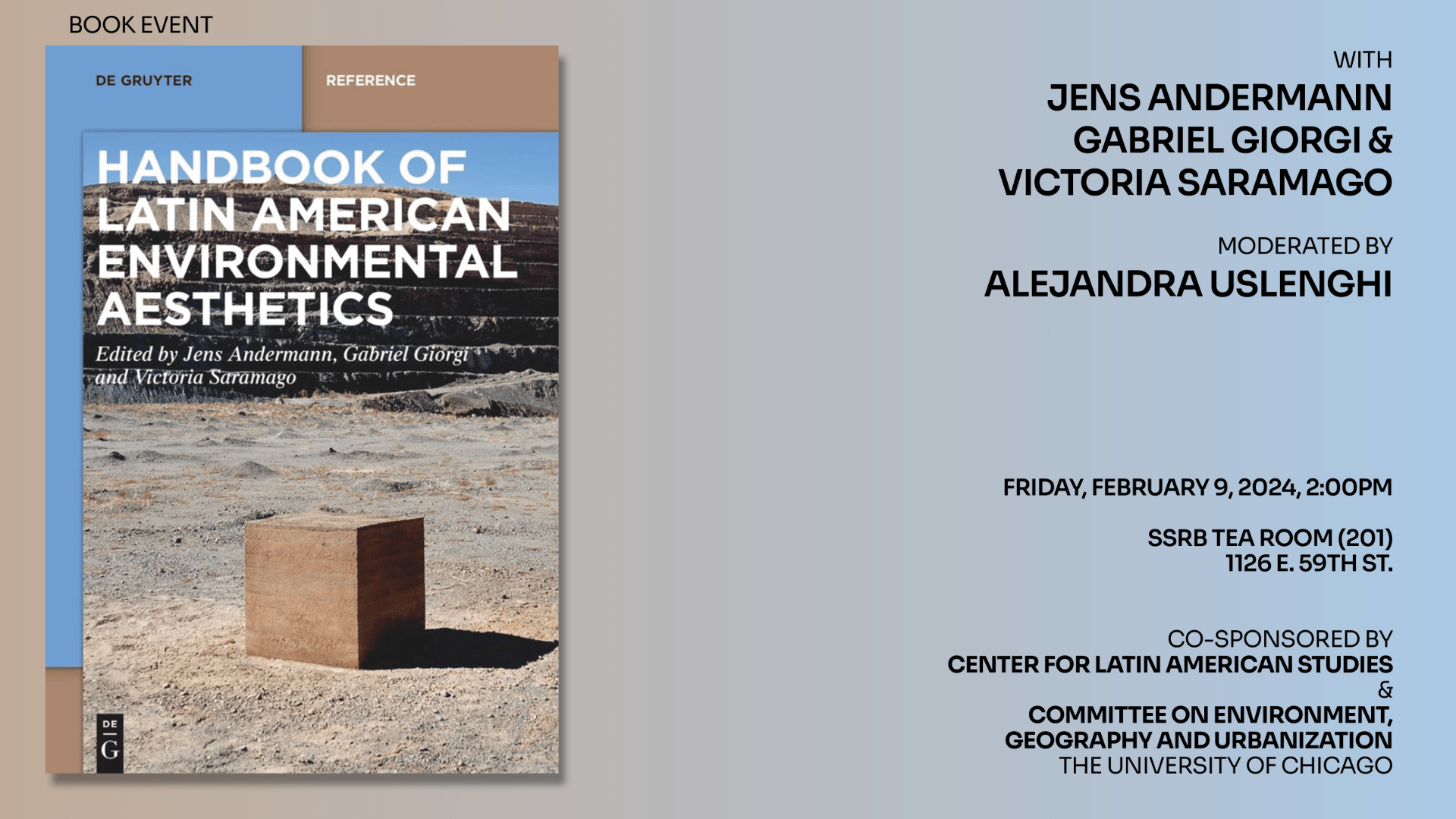
Co-sponsored Event
with editors
Jens Andermann
Gabriel Giorgi &
Victoria Saramago
moderated by
Alejandra Uslenghi
Friday, February 9, 2024, 2:00pm
SSRB Tea Room (201)
1126 E. 59th St.
More Info
The Handbook of Latin American Environmental Aesthetics↗ offers a comprehensive overview of Latin American aesthetic and conceptual production addressing the more-than-human environment at the intersection between art, activism, and critique. Fields include literature, performance, film, and other audiovisual media as well as their interactions with community activisms. Scholars who have helped establish environmental approaches in the field as well as emergent critical voices revisit key concepts such as ecocriticism, (post-)extractivism, and multinaturalism, while opening new avenues of dialogue with areas including critical race theory and ethnicity, energy humanities, queer-*trans studies, and infrastructure studies, among others. This volume both traces these genealogies and maps out key positions in this increasingly central field of Latin Americanism, at the same time as they relate it to the environmental humanities at large.
By showing how artistic and literary productions illuminate critical zones of environmental thought, articulating urgent social and material issues with cultural archives, historical approaches and conceptual interventions, this volume offers cutting-edge critical tools for approaching literature and the arts from new angles that call into question the nature/culture boundary.
CEGU Event
Saadia Mirza, American University in Paris & University of Chicago
Alberto Ortega Trejo, School of the Art Institute of Chicago & University of Chicago
Joshi Radin, Chicago-based Artist/Writer
Alexander Arroyo, University of Chicago (moderator)
Jessica Landau, University of Chicago (introduction)
Thursday, January 25, 2024
6:00–7:30pm
Smart Museum of Art, 5550 S. Greenwood Ave.
More Info
Individual and collective experiences of climate change are mediated simultaneously by embodied encounters with extreme weather events and by now-familiar abstractions of climate models and satellite imagery. As we grapple with the increasing dissonance between everyday life and epochal climatic and environmental change, how might we hold these intimate and remote forms of sensing in generative tension? How might we learn from the space between what we can touch, smell, see, or hear and what we can observe or study from afar? This event explores how the prescient work of sculptor Ruth Duckworth might guide us through that space, offering insight and inspiration for ways of knowing climate and its many forms of change through embodied aesthetic practice. In so doing, Duckworth points toward new forms of climate media attuned to the multiple scales of transformation– climatic, environmental, social, bodily– to which we must so urgently attend.
Join us for a conversation with UChicago faculty and distinguished guests, sponsored by the Committee on Environment, Geography, and Urbanization (CEGU) and the Smart Museum of Art’s Feitler Center for Academic Inquiry.
CEGU Event, CEGU Colloquium
The WAstemen's fossil flora: geology and labor in britain's energy transition , 1819-1845
Fredrik Albritton Jonsson, History & CEGU
Benjamin Morgan, English & CEGU (discussant)
Friday, November 17, 2023
12:00–2:00pm CT
SSRB Tea Room, 1126 E. 59th St.
More Info
The deep coal mine was the work site of Carboniferous geology. The richest evidence came not from the coal seams themselves but the shale layers that surrounded them. This meant that fossils came to light principally when tunnels collapsed. Fossil collection in the colliery was a high-risk activity associated with maintenance, repair, and danger to life and limb. The key figure in such work was the wasteman. The task of the wasteman was to walk the pits to survey the air courses and keep them in good repair. The wastemen also took stock of the stability of pillars and old workings. Sigillaria fossils posed a particular risk to colliers. Their heavy trunks frequently slipped out of the roof, leaving gaping holes, sometimes as wide as five feet in diameter. Constant surveillance of waste and shale was thus a critical task, vital to the security of the colliery and the lives of the people there. Yet references to the work of the wasteman are very rare in geological texts from the period. In natural theology, the divine work of the Creator took precedence and erased the social world of the collier. Fossils were seen as emblems of providential time, not products of the wasteman’s working day. Sigillaria and other coal plants had purged the atmosphere of surplus carbonic acid and deposited it in the Carboniferous strata. Thanks to the accumulation of carbon in the underground, the atmosphere of the planet had become “fit for the support of animal life, and human habitation.” Coal was not just the fuel of British wealth but also the life-giving force that had made the planet habitable. The erasure of the colliery worker from geology paved the way for a cosmology of carbon. At the same time as mining engineers and wastemen traced the gas flows inside the coalmine, geologists began to imagine God as the wasteman of the carbon cycle, regulating the atmosphere, channeling carbon back and forth through plants, earth, and air.
Co-sponsored Event
Revisiting Data center energy-use estimates
Wednesday, November 8, 2023
3:00–4:00pm CT
Room 298, John Crerar Library
(5730 S Ellis Ave)
More Info
Information and communication technology (ICT) is already pervasive in virtually all aspects of everyday life and recent wide-scale availability of AI portends an accelerated reliance on a more digitalized world. Data centers are the backbone of ICT and concern about the energy-intensive equipment within these buildings has led to many legitimate concerns - along with sensational claims - over the environmental implications of a society increasingly reliant on data-intensive services.
This presentation will compare these oft-cited claims against previous Berkeley Lab research, which have historically shown much more modest growth in energy use owing to strong energy-efficiency trends, and present current research around emerging computing trends that require rethinking current sustainability efforts. The presentation will highlight decarbonization opportunities of the ICT industry as well as how ICT can be used to decarbonize other sectors.
CEGU Colloquium
Julia Mead, Ph.D. Candidate in History
Wednesday, November 1, 2023
4:00–5:30pm CT
John Hope Franklin Room (224), Social Science Research Building (1126 E. 59th St.)
More Info
The post-socialist period in East Central Europe was a period of rapid energy transition. From 1948-1989, states in this region relied almost exclusively on domestic coal for industrial and residential heating and electricity, in the process transforming their mining regions into some of the most toxic environments in the world. After 1989, as newly elected governments and foreign economic advisers privatized state industries through a process of “shock therapy,” wealthy investors bought majority shares in coal mining enterprises and shuttered many mines deemed unprofitable. Using records from the corporate archives of the successor company to the state’s largest coal enterprise, this paper traces the privatization process in Czechoslovakia/Czech Republic as an emblematic case study in social consequences of de-carbonization for energy workers. Under socialism, the state coal mining enterprise was sprawling; hundreds of houses, tens of thousands of apartments, dozens of cafeterias, clinics and hospitals, laundries, recreation centers, hotels, bus depots, dormitories, a travel agency, and even a seaside campground in Bulgaria, all available for free or at extremely low cost to energy workers and their families. The mine’s post-1989 owners concluded that these services must be “converted to a profit-making basis” and, in the process, transformed from rights to commodities.
This paper argues that the privatization process forced government officials, foreign economic advisers, and miners to resolve deep ontological questions: What is a coal mine? Who is a coal miner? Each group had a different answer arising from their divergent assumptions of what elements of the economy and human behavior are “natural.” Miners rejected the idea that economic competition is a natural human (and, indeed, manly) endeavor, arguing instead that “every man naturally seeks certainty in all spheres of life.” This paper treats the process of de-carbonization in post-socialist Czechoslovakia as an ambiguous transition. Cleaner energy and a healthier environment came yoked to new and profound uncertainty for energy workers, in which services workers had long taken as their right—housing, light, heat, leisure, medical care—became governed by the market. In the process, unemployment, homelessness, and poverty, once unimaginable to energy workers, became common.
Julia Mead is an environmental historian of Eastern Europe. She is a PhD candidate in history at the University of Chicago. Her dissertation, “Socialist Rust Belt: Energy, Masculinity, and the End of Czechoslovak Socialism” traces the rise and fall of the Czechoslovak coal industry from 1948-2004 and its relationship to changing norms of masculinity.
CEGU Event, CEGU Colloquium
Megan Black, MIT
Elizabeth Chatterjee, University of Chicago (discussant)
Friday, October 27, 2023
12:00–1:30pm CT
Room 142, 1155 E. 60th St.
More Info
The talk will examine how Friends of the Earth helped make Crested Butte, Colorado's fight against the multinational mining firm AMAX a household name in the 1970s (while neglecting to provide the same level of dug-in support to other communities that, unlike this town, were not inhabited by a nature-seeking group of white elites), asking about the possibilities and limitations of multiscalar activism seeking to move from local to global.
This event is co-sponsored by International House. Please note, this event will take place in person only. A recording will be made available shortly afterwards.
CEGU Colloquium
Elaine Colligan, Ph.D. Student in Political Science
Friday, October 20, 2023
12:00–2:00pm CT
Room 142, 1155 E. 60th St.
More Info
In a moment of world-destroying environmental breakdown, political actors are increasingly claiming that nature should have rights. What are the political stakes of these claims? Against their scholarly critics, who contend that extending rights to nature is a philosophically incoherent idea and thus politically ineffective, I contend that when political actors claim that nature should have rights, they are not attempting to extend rights to a new class of subjects but potentially transforming the concept of rights. This is not to say that nature simply can have rights; I agree that nature’s rights encounter “conceptual strain," both hold that this does not entail that nature’s rights could never “make sense.” If we understand nature’s rights not as a pre-linguistic and pre-political concept, but rather as an everyday practice of making political claims, we can see how these performative acts of democratic persuasion might make sense anew. Innovating at the fuzzy boundary between the rule-bound and radically open character of language, claims that nature should have rights defamiliarize the grammar of both rights and nature.
Co-sponsored Event, CEGU Colloquium
Sarah Newman, Claudia Brittenham, Pauline Goul, and Mariana Petry Cabral
Wednesday, October 11, 2023
5:00pm CT
Assembly Hall, International House (1414 E. 59th St.)
More Info
Garbage is often assumed to be an inevitable part and problem of human existence. But when did people actually come to think of things as “trash”—as becoming worthless over time or through use, as having an end?
Unmaking Waste tackles these questions through a long-term, cross-cultural approach. Drawing on archaeological finds, historical documents, and ethnographic observations to examine Europe, the United States, and Central America from prehistory to the present, Sarah Newman traces how different ideas about waste took shape in different times and places. Newman examines what people consider to be “waste” and how they interact with it, as well as what happens when different perceptions of trash come into conflict. Conceptions of waste have shaped forms of reuse and renewal in ancient Mesoamerica, early modern ideas of civility and forced religious conversion in New Spain, and even the modern discipline of archaeology. Newman argues that centuries of assumptions imposed on other places, times, and peoples need to be rethought. This book is not only a broad reconsideration of waste; it is also a call for new forms of archaeology that do not take garbage for granted. Unmaking Waste reveals that waste is not—and never has been—an obvious or universal concept.
Please join CEGU, the Center for International Social Science Research (CISSR), and the Center for Latin American Studies (CLAS) for a roundtable discussion and reception with the author at International House.
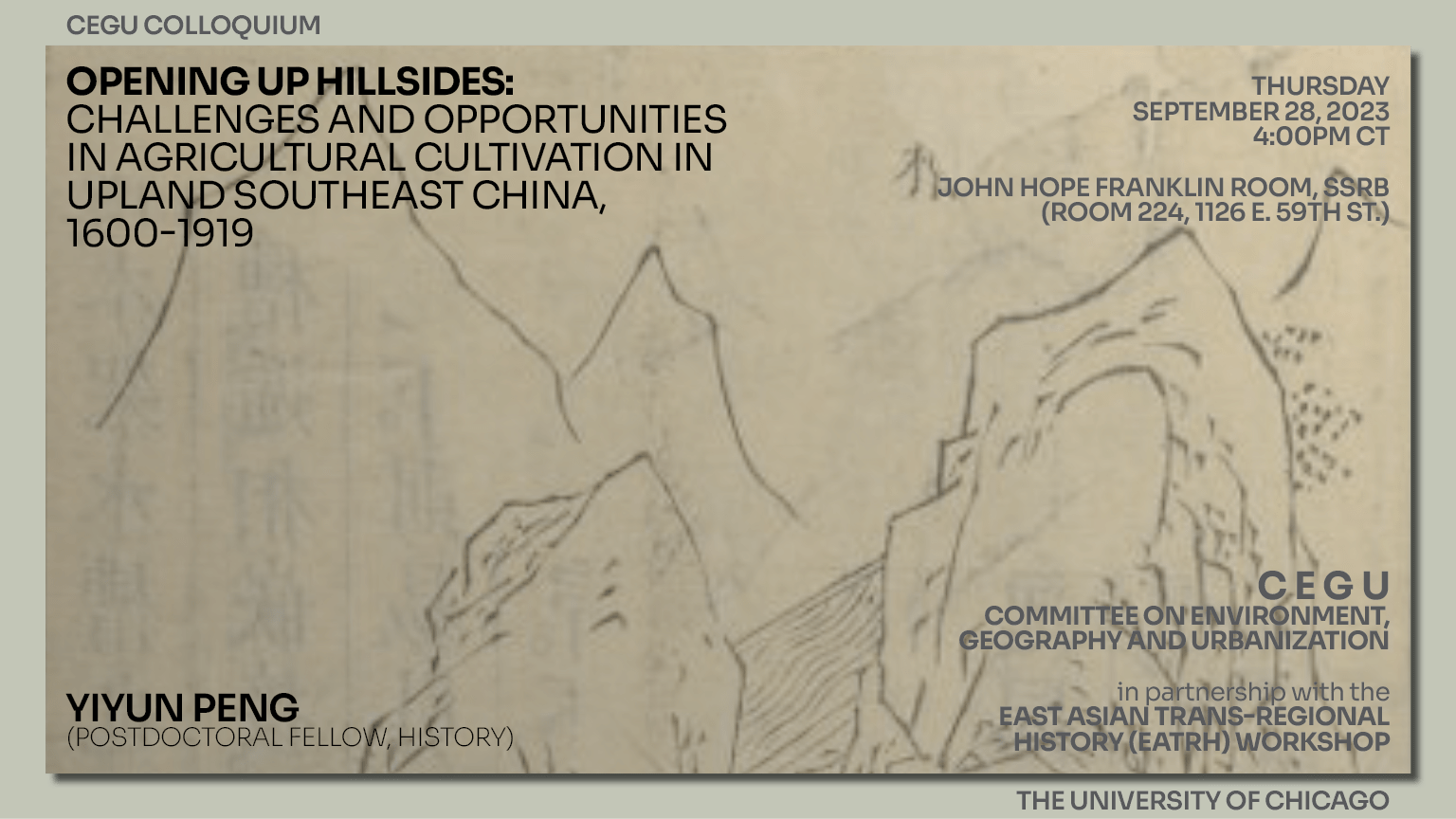
CEGU Colloquium
Yiyun Peng, Postdoctoral Fellow in History
Thursday, September 28, 2023
4:00pm CT
John Hope Franklin Room, SSRB
(Room 224, 1126 E. 59th St.)
More Info
How did uplands, often presumed inhospitable to agriculture, set limits to and provide opportunities for the cultivation of crops? How did mountain people address the difficulties and utilize and shape the upland environment when cultivating hill- and mountainsides? This article goes beyond two lines of well-established scholarship on upland cultivation in general: one that focuses on typically mountain businesses including lumbering, mining, and hunting; the other on environmental degradation as the result of agricultural cultivation. Instead, by focusing on aspects such as infertility, limited water supply, cold temperature, and elevation in late imperial upland Southeast China, this article discusses the ways in which the agricultural cultivators made efforts to deal with the unforgiving environment. It also reveals how the cultivators utilized various seemingly adverse elements in the uplands, such as cliffs and shadowed space, to their advantage.
By the sixteenth century, most of the fertile bottomland in the valleys and basins and some of the easily accessible hillsides in upland Southeast China had been cultivated into paddy fields. Thereafter, against the context of rapid population growth, a large number of people sojourned in this region and went to great lengths to cultivate deep mountains with food and cash crops, including indigo, tobacco, and New World food crops. Through a close examination of the materiality of mountains and the technicality of mountain people’s cultivation activities, this article contributes to a better understanding of making a living in this complex environment through agriculture.
Yiyun Peng received her PhD in history from Cornell University in August 2023 and joined the Department of History at UChicago after graduation as a postdoctoral fellow. She is mainly interested in environmental history, the history of technology, and economic history. While her main focus is on China, she has also been doing research on Southeast Asia, in particular the Malay world. Her dissertation works on a few cash crops and the handicraft industries processing them into commodities—indigo dye, bamboo paper, tobacco, and ramie (a fiber plant) cloth—led to a herbaceous revolution in upland Southeast China from the sixteenth to the mid-twentieth century, which profoundly transformed the region’s environment and society. The dissertation is a winner of the Messenger Chalmers Prize for the best dissertation in the Department of History at Cornell University.
EVENTS: 2022–23
CEGU Event
Fredrik Albritton Jonsson, The University of Chicago
Carl Wennerlind, Barnard College
Dipesh Chakrabarty, University of Chicago (moderator)
Thursday, May 18, 2023
5:00pm-6:30pm CT
John Hope Franklin Room, Social Sciences Research Building 224
More Info
"Our book offers a new interpretation of the idea of scarcity in economic thought. We explain how modern economics arrived at its influential axiom of scarcity - infinite wants in a finite world - and also why this peculiar definition has no claim to universal validity. There are many other ways of imagining the relation between nature and the economy. We demonstrate the historical contingency of neoclassical scarcity by reconstructing the intellectual and environmental context of a dozen alternative conceptions of scarcity across 500 years of European thought. Our book ends with a plea for a new kind of economics oriented towards ecological repair rather than infinite growth."
This event is co-organized by the Center for International Social Science Research (CISSR) and the Committee on Environment, Geography and Urbanization (CEGU).
Co-sponsored Event
Organized by Victoria Saramago and Eduardo Leão
May 17–18, 2023
Franke Institute for the Humanities, Regenstein Library (1100 E. 57th St.)
More Info
This conference aims to bring to campus scholars conducting cutting-edge research on the Amazonian region in the United States today. Our purpose is to present scholars from a range of fields in the Humanities and Social Sciences in order to provide to the university’s academic community a panorama of the questions, themes, and problems that have been guiding current scholarship and cultural production on the Amazon. How is the region’s history, from the late-nineteenth-century rubber boom to the expanding deforestation of the 1970s, present in contemporary inquiries? What is the role of Indigenous thought and cultural production, including visual arts as well as film and verbal arts, in today’s Amazonian and international cultural scenes? How has the Amazon become a fertile ground for the production of speculative fiction? In a region where Indigenous presence has received so much attention, how to account for the large and vibrant presence of Black and other brown populations?
This event is co-sponsored by CEGU, the Center for Latin American Studies, the Department of Romance Languages and Literatures, and the Franke Institute for the Humanities.
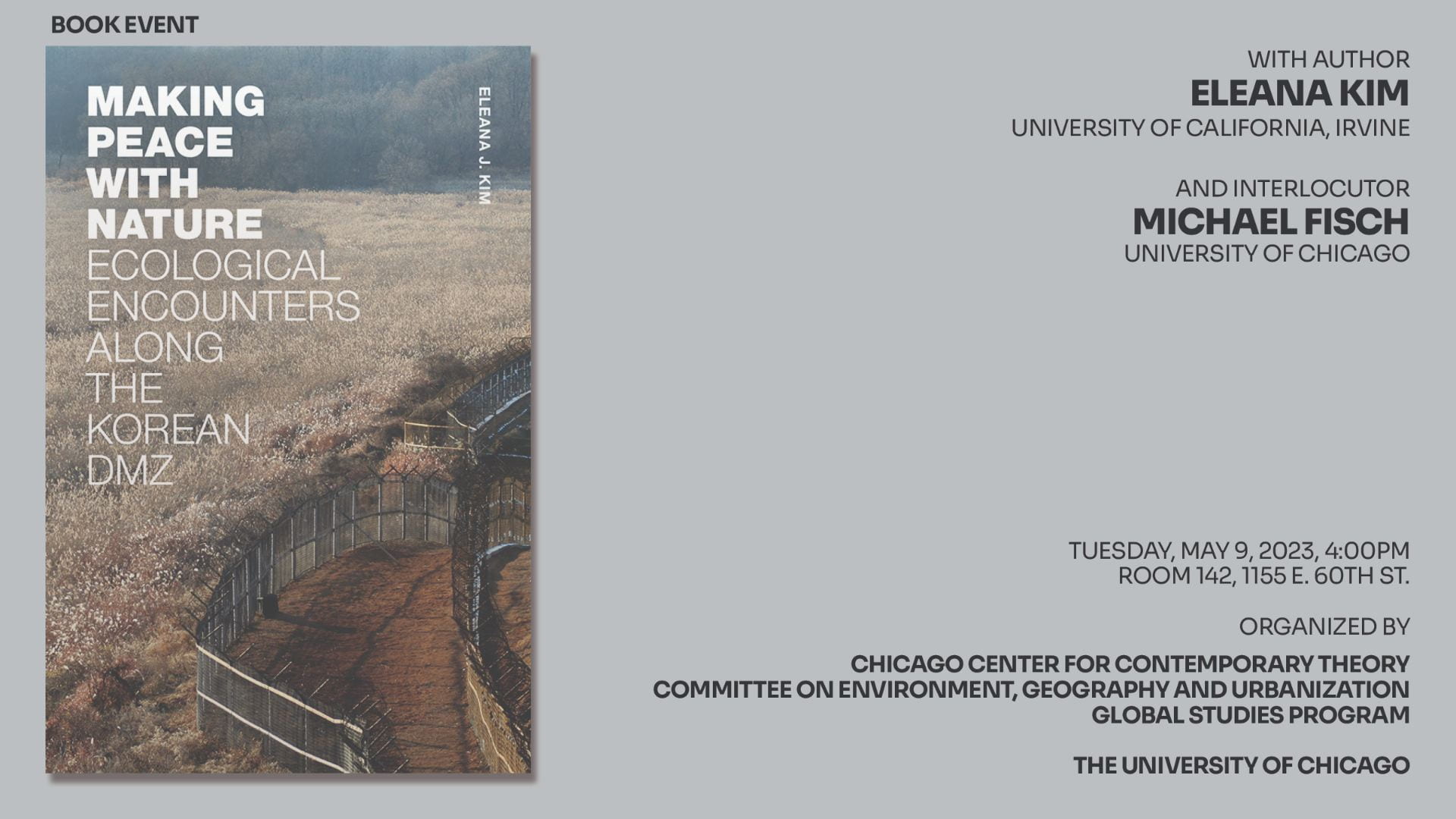
Book Event
Eleana Kim, University of California, Irvine
Michael Fisch, University of Chicago (interlocutor)
Tuesday, May 9, 2023
4:00pm CT
Room 142, 1155 E. 60th St.
More Info
This book talk discusses Eleana Kim’s recently published ethnography of the ecologies of the South Korean borderlands, in areas adjacent the Korean Demilitarized Zone. Based on fieldwork with ecologists, environmentalists, and residents who live along the border, this book reframes the Korean DMZ and the national division around more-than-human peace. It also argues that militarized ecologies deserve greater attention in the context of climate crisis and the convergence of militarization and privatization at a planetary scale.
Eleana Kim is a sociocultural anthropologist and professor of anthropology and Asian American Studies at University of California, Irvine. She is the author of Making Peace with Nature: Ecological Encounters along the Korean DMZ (2022) and Adopted Territory: Transnational Korean Adoptees and the Politics of Belonging (2010), both published by Duke University Press. She currently serves as the president of the Society for Cultural Anthropology.
Co-sponsored Event
2023 Annual Weissbourd Conference
Friday, May 5, 2023
9:30am–5:15pm
Third Floor Lecture Hall, Swift Hall (1025 E. 58th St.)
More Info
The 2023 Weissbourd Annual Conference will explore questions of value, as well as practical and normative issues, concerning human communities' relationship with the environment and other animals in it.
CEGU Book Event
Michael Kimmelman, New York Times
Evan Carver, University of Chicago (interlocutor)
Tuesday, May 2, 2023
6:00pm-7:00pm CT
Seminary Co-op Bookstore (5751 S. Woodlawn Ave.)
More Info
“The Intimate City is a joyful miscellany of people seeing things in the urban landscape, the streets alive with remembrances and ideas even when those streets are relatively empty of people.”—Robert Sullivan, New York Times Book Review
As New York came to a halt with COVID, Kimmelman composed an email to a group of architects, historians, writers, and friends, inviting them to take a walk. Wherever they liked, he wrote—preferably someplace meaningful to them, someplace that illuminated the city and what they loved about it. At first, the goal was distraction. At a scary moment when everything seemed uncertain, walking around New York served as a reminder of all the ways the city was still a rock, joy, and inspiration. What began with a lighthearted trip to explore Broadway’s shuttered theater district and a stroll along Museum Mile when the museums were closed soon took on a much larger meaning and ambition. These intimate, funny, richly detailed conversations between Kimmelman and his companions became anchors for millions of Times readers during the pandemic. The walks unpacked the essence of urban life and its social fabric—the history, plans, laws, feats of structural engineering, architectural highlights, and everyday realities that make up a place Kimmelman calls “humanity’s greatest achievement.”
Filled with stunning photographs documenting the city during the era of COVID, The Intimate City is the ultimate insider’s guide. The book includes new walks through LGBTQ Greenwich Village, through Forest Hills, Queens, and Mott Haven, in the Bronx. All the walks can be walked, or just be read for pleasure, by know-it-all New Yorkers or anyone else. They take readers back to an age when Times Square was still a beaver pond and Yankee Stadium a salt marsh; across the Brooklyn Bridge, for green tea ice cream in Chinatown, for momos and samosas in Jackson Heights, to explore historic Black churches in Harlem and midcentury Mad Men skyscrapers on Park Avenue. A kaleidoscopic portrait of an enduring metropolis, The Intimate City reveals why New York, despite COVID and a long history of other calamities, continues to inspire and to mean so much to those who call it home and to countless others.
Michael Kimmelman is the architecture critic of The New York Times. He has reported from more than 40 countries, was previously The Times's chief art critic and, based in Berlin, created the Abroad column, covering cultural and political affairs across Europe and the Middle East. Twice a Pulitzer Prize finalist, he is the founder and editor-at-large of a new venture focused on global challenges and progress called Headway.
Frizzell Learning & Speaker Series
Michael Kimmelman, New York Times
Nootan Bharani, University of Chicago, Arts + Public Life (interlocutor)
Monday, May 1, 2023
4:30pm-6:00pm CT
The Theatre, Ida Noyes Hall (1212 E. 59th St., Third Floor)
More Info
When climate change, aging infrastructure and an affordable housing crisis pose existential threats to our cities and society, why has it become so difficult to get big things done? Are some of the very rules and regulations put in place to solve these sorts of problems getting in the way? A look at the troubled aftermath of Hurricane Sandy in New York City, at some of the obstacles to addressing homelessness, and at some challenges to the construction of subsidized housing around the country.
Michael Kimmelman is the architecture critic of The New York Times. He has reported from more than 40 countries, was previously The Times's chief art critic and, based in Berlin, created the Abroad column, covering cultural and political affairs across Europe and the Middle East. Twice a Pulitzer Prize finalist, he is the founder and editor-at-large of a new venture focused on global challenges and progress called Headway.
Inaugural CEGU Conference
Calvin & Freda Redekop Lecture in Environment and Society By
Holly Jean Buck
Panels Featuring
Max Ajl, Hillary Angelo, Helen Anne Curry, Billy Fleming, Vinay Gidwani, Pauline Goul, Jo Guldi, Ihnji Jon, Josh Lepawsky, Shannon Mattern, Ivette Perfecto, and Xiaowei R. Wang
Moderated by CEGU Faculty
Alexander Arroyo, Grga Bašić, Neil Brenner, Elizabeth Chatterjee, Gary Herrigel, Catherine Kearns, and Sabina Shaikh
April 20–21, 2023
Room 122, Regenstein Library (1100 E. 57th St.)
Co-sponsored Conference
Keynotes
Peter Galison, Sophia Rosenfeld, Jules Gill-Peterson, and Myrna Perez Sheldon
Speakers
Ken Alder, Nima Bassiri, Etienne Benson, Meghna Chaudhuri, Terence Keel, Adam Leeds, Mary Mitchell, Amy E. Slaton, Jessica Wang, and Julie White
Organizers
Isabel Gabel, Stephanie Dick, and Marc Aidinoff
April 7–8, 2023
More Info
Science and liberalism appear to be bound more and more tightly as the crises of the present moment, from the pandemic to severe weather events, make painfully clear. This conference begins from the observation that liberalism and science have always been linked in ways that are both explicit and unspoken. At the same time that historical scholarship has laid bare the genealogies of liberalism in relation to colonialism, racism, and capitalism, science studies scholars and historians of science have revealed the many ways that science is produced and bounded by the social worlds it inhabits. In light of these critical traditions, we will bring together a diverse group of scholars to explore two related themes.
First, we will interrogate the ways “science” furnishes the liberal world with many of its key features, including for example individuality, diversity, autonomy/choice, and security. In other words, taking seriously the critical genealogies of liberalism that have emerged in recent years, we will examine the role of the sciences in that history of liberalism.
Second, we will attempt to make explicit the decidedly liberal contexts in which our fields have taken shape, with the aim of understanding how this context may have limited our collective understanding of the histories of science, technology and medicine. Our goal is to move past the idea that there is a single choice – either critique science rigorously but risk giving ammunition to illiberal forces or defend science as a part of liberal technocracy’s last gasping breaths. Both options serve liberalism. Maybe there are new ways to do critical scholarship on science.
Please visit the conference website↗ for full details.
This event is organized by the Institute on the Formation of Knowledge and co-sponsored by CEGU.
![Arnaud Orain on Lost Economic Knowledge Flyer(1)[31] poster for February 2023 New Book Salon with Nancy Fraser, co-organized with 3CT](https://voices.uchicago.edu/cegu/files/2023/02/Arnaud-Orain-on-Lost-Economic-Knowledge-Flyer131.jpg)
![Arnaud Orain on Lost Economic Knowledge Flyer(1)[31] poster for February 2023 New Book Salon with Nancy Fraser, co-organized with 3CT](https://voices.uchicago.edu/cegu/files/2023/02/Arnaud-Orain-on-Lost-Economic-Knowledge-Flyer131.jpg)
Co-sponsored Event
Arnaud Orain, Université Paris 8
Fredrik Albritton Jonsson, University of Chicago (commentary)
Wednesday, March 1, 2023
5:00pm CT
Classics 110, 1010 E. 59th St.
More Info
An exploration of the subaltern ecologies of the Enlightenment that explores the lost world of artisanal and peasant knowledge rivaling eighteenth-century political economy and natural history. Based on the forthcoming Les savoirs perdus de l'économie: contribution à l'équilibre du vivant, Gallimard, NRF essais.
Sponsored by the Department of History and CEGU
CEGU Event
Nancy Fraser, The New School
Jason W. Moore, Binghamton University
Aaron Jakes, University of Chicago (moderator)
Friday, February 10, 2023
12:00pm CT
Room 142, 1155 E. 60th St.
More Info
In this public dialogue, two of the leading social theorists of our time discuss the origins, manifestations and consequences of environmental crisis on our rapidly warming planet.
Over the last decade, political theorist Nancy Fraser and historical geographer Jason W. Moore have been among the most influential and systematic proponents of the claim that contemporary environmental emergencies are best understood in relation to—and as a direct expression of—capitalism’s underlying crisis-tendencies. On this understanding, the accumulation of capital is not simply a social or economic process that engenders damaging ecological effects. Rather, capital is itself a way of organizing nature, and thus environmental disasters such as global warming and biodiversity loss reflect its systematic devaluation or “cheapening” of the entire planetary web of life in both human and nonhuman forms. These operations are obscured, they argue, in dominant market-centric and technoscientific discourses, which treat nature as an exterior parameter or infinitely renewable resource supply for human consumption. In contrast, Fraser and Moore seek to draw attention to the “hidden abodes” of human and nonhuman reproductive work that support the operations of capital, and indeed, life itself on planet earth.
Moore and Fraser have been developing closely parallel lines of argument and discussing each other’s work for quite some time. In this conversation, moderated Professor Aaron Jakes of the Department of History, these eminent scholars will share the stage to consider what their respective approaches to an account of “capitalism’s natures” might offer to scholarship on the climate crisis, and to ongoing struggles to create more equitable, democratic, and livable ways of organizing our shared planetary existence.
Please note, this event will take place in person only. A recording will be made available shortly afterwards.
3CT New Book Salon
Nancy Fraser, The New School
Ryan Cecil Jobson, University of Chicago (interlocutor)
Lisa Wedeen, University of Chicago (moderator)
Thursday, February 9, 2023
6:00pm CT
Seminary Co-op Bookstore, 5751 S. Woodlawn Ave.
More Info
Please join us to celebrate Nancy Fraser’s recent book, Cannibal Capitalism: How Our System Is Devouring Democracy, Care, and the Planet—and What We Can Do About It (Verso Books, 2022). Fraser will be joined in conversation by CEGU faculty Ryan Cecil Jobson as interlocutor and Lisa Wedeen as moderator.
Capital is currently cannibalizing every sphere of life–guzzling wealth from nature and racialized populations, sucking up our ability to care for each other, and gutting the practice of politics. In this tightly argued and urgent volume, leading Marxist feminist theorist Nancy Fraser charts the voracious appetite of capital, tracking it from crisis point to crisis point, from ecological devastation to the collapse of democracy, from racial violence to the devaluing of care work. These crisis points all come to a head in Covid-19, which Fraser argues can help us envision the resistance we need to end the feeding frenzy.
What we need, she argues, is a wide-ranging socialist movement that can recognize the rapaciousness of capital— and starve it to death.
This event is co-organized by the Chicago Center for Contemporary Theory (3CT) and CEGU.
Please note, this event will take place in person only.
Economic History Seminar
Jason W. Moore, Binghamton University
Tuesday, February 7, 2023
5:00–6:00pm CT
SSRB Tea Room, 1126 E. 59th St. (2nd floor)
More Info
Jason W. Moore is an environmental historian and historical geographer at Binghamton University, where he is professor of sociology and leads the World-Ecology Research Collective. He is author or editor, most recently, of Capitalism in the Web of Life (Verso, 2015), Capitalocene o Antropocene? (Ombre Corte, 2017), Anthropocene or Capitalocene? Nature, History, and the Crisis of Capitalism (PM Press, 2016), and, with Raj Patel, A History of the World in Seven Cheap Things (University of California Press, 2017).
The organizers request that attendees read Jason Moore’s paper in advance. Click here to access the paper.
CEGU Book Event
Manuel P. Teodoro, University of Wisconsin-Madison
Sabina Shaikh, University of Chicago (interlocutor)
Thursday, February 2, 2023
6:00pm CT
Seminary Co-op Bookstore (5751 S. Woodlawn Ave.)
More Info
The burgeoning bottled water industry presents a paradox: Why do people choose expensive, environmentally destructive bottled water, rather than cheaper, sustainable, and more rigorously regulated tap water? The Profits of Distrust links citizens' choices about the water they drink to civic life more broadly, marshalling a rich variety of data on public opinion, consumer behavior, political participation, geography, and water quality. Basic services are the bedrock of democratic legitimacy. Failing, inequitable basic services cause citizen-consumers to abandon government in favor of commercial competitors. This vicious cycle of distrust undermines democracy while commercial firms reap the profits of distrust – disproportionately so from the poor and racial/ethnic minority communities. But the vicious cycle can also be virtuous: excellent basic services build trust in government and foster greater engagement between citizens and the state. Rebuilding confidence in American democracy starts with literally rebuilding the basic infrastructure that sustains life.
Please join CEGU for a discussion between co-author Manny Teodoro and CEGU Director of Academic Programs Sabina Shaikh for a conversation about the book at the Seminary Co-op Bookstore.
CEGU Event
Jeff Hou, University of Washington
Stephanie Wakefield, Life University
Evan Carver, University of Chicago (moderator)
Thursday, January 12, 2023
5:00–6:30pm CT
Room 142, 1155 E. 60th St.
More Info
Environmental Studies Workshop
Bathsheba Demuth, Brown University
Matthew Johnson, Harvard University
Owain Lawson, University of Toronto
Jen Rose Smith, University of Wisconsin-Madison
Alexander Arroyo, University of Chicago (moderator)
Elizabeth Chatterjee, University of Chicago (moderator)
Friday, November 18, 2022
12:00pm CT
Harper 104 (1116 E. 59th St.)
More Info
The historical geographies of extractivism and empire cut across the division between “Global North” and “Global South.” This roundtable brings together scholars working on the Russian and North American Arctic, Brazil, and Lebanon for a conversation across regions rarely placed in the same frame. We will trace the surprising parallels and uncanny connections between histories of energy extraction and ecological transformation on very different colonial and capitalist resource frontiers. We will explore, too, sources of hope: the nodes of resistance and alternative imaginaries generated by projects of Indigenous and decolonial worldmaking.
This session of the Environmental Studies Workshop is co-sponsored by the Urban Theory Lab and the Neubauer Collegium Project on Fossil Capitalism on the Global South.
CEGU Event
Chandana Anusha, Northwestern University
Rachel Gittman, East Carolina University
Liz Koslov, UCLA
Michael Fisch, University of Chicago (moderator)
Thursday, November 17, 2022
4:30–6:00pm CT
Classics 110 (1010 E. 59th St.) & Zoom Webinar
More Info
Climate change is dramatically transforming the planet’s coastal terrains, rendering densely settled communities, vibrant ecosystems, and large-scale infrastructure vulnerable to an unprecedented range of threats. Insofar as coastlines typically constitute the borders of national states and their geopolitical operations, they are also at the core of planetary environmental, economic and societal transformations. From industrial ports, large-scale metropolitan regions and long-distance transportation corridors to coastal fishing villages, mudflats, wetlands, and marshes, coastlines represent multidimensional spaces of interface between heterogeneous ecologies and infrastructural configurations; national, regional and urban economies; multinational corporations; diverse forms of territorial governance; and regionally embedded circuits of social reproduction. These vital but delicate spaces are in peril.
How should we understand these transformations? What are their implications for inherited forms of social life, spatial organization, and territorial governance? What kinds of interventions might be imagined and mobilized to mitigate their effects not only upon coastlines, but upon the planet as a whole?
This panel brings together scholars from diverse fields—including urban planning, anthropology, sociology, landscape design, and architecture—whose work addresses emerging coastal vulnerabilities, transformations and crises in various sites around the world; their uneven social and spatial impacts; and emergent strategic responses. It will present an interdisciplinary conversation with the aim of generating new approaches to understanding—and shaping—the rapidly mutating environmental conditions of our time.
CEGU Event
A Roundtable with CEGU Faculty:
Alexander Arroyo
Sarah Fredericks
Amir Jina
Sarah Newman
Jennifer Scappettone
Sabina Shaikh (moderator)
Thursday, October 20, 2022
4:30–4:45pm CT—Welcome Reception
4:45–6:30pm CT—Roundtable Event
SSRB Tea Room (1126 E. 59th St.) & Zoom Webinar
More Info
Following the latest report of the Intergovernmental Panel on Climate Change (IPCC), UN secretary-general António Guterres declared that the earth “is on a fast track to climate disaster.” In order to avoid “tipping points that could lead to cascading and irreversible climate impacts,” secretary-general Guterres advocated an accelerated shift to renewable energy sources and a rapid downscaling of fossil fuel production and consumption. However, even as catastrophic floods, storms, heatwaves and fires proliferate across the planet, accompanied by devastating human suffering, population displacement, landscape destruction, and infrastructure damage, the fossil fuel industry remains globally dominant. While some governments seek to accelerate the transition to renewable energy and more sustainable social arrangements, many powerful states continue to subsidize fossil fuels and to grant permits for their continued exploration and extraction. Amidst these contradictory tendencies, climate activists and citizens around the world continue to develop strategies to protest the status quo, to pressure governments to limit or ban CO2-emitting machines, and to repair the massive social and environmental damage induced during the “long fossil boom” of the last 150 years.
Against the background of these intense transformations, crises and struggles, this panel of CEGU faculty considers the contribution of social science and humanities research to our ability to understand—and to shape—emergent environmental conditions, from the local to the planetary scales. The panel brings together scholars from diverse disciplinary locations—archeology, anthropology, economics, English, creative writing, geography, political ecology, philosophy, and public policy—to dialogue and debate about contemporary climate emergencies, their historical genealogies, their uneven geographies, their emergent dynamics, and their future implications. This event represents the first in a year-long series of discussions organized by CEGU to support research, teaching, and public dialogue about the social, historical, spatial and (geo)political dimensions of contemporary environmental transformations and crises.
EVENTS: 2021–22
CEGU Event
Animals, Territories, Environments
Matthew Gandy, University of Cambridge
Mindi Schneider, Wageningen University
Neil Brenner, University of Chicago (moderator)
Victoria Saramago, University of Chicago (moderator)
Friday, April 29, 2022, 12:30–2:00pm CT
Zoom
Lenticular Ontologies
Ghassan Hage, University of Melbourne
Wednesday, March 30, 2022, 5:00pm CT
SSRB Tea Room, 1126 E. 59th St. & Zoom (Hybrid Event)
More Info
People who have social and affective connections to a multiplicity of geographical locations, such as immigrants, are often portrayed as dwelling and being torn between places. In his recent book, The Diasporic Condition (University of Chicago Press, 2021), Ghassan Hage argues that this is not always the case; that rather than being torn between two or three places people are also capable of dwelling in all these places at the same time. One needs to pluralize one’s conception of what it means to dwell in and occupy a place, and the idea of inhabiting simultaneously a multiplicity of locations becomes easier to conceive. But to what extent do we all inhabit a multiplicity of realities? And if we do, what are the critical analytical consequences of approaching social existence in this way?
Ghassan Hage is professor of anthropology and social theory at the University of Melbourne in Australia. He is the author of several books, including White Nation, Against Paranoid Nationalism, After-Politics, and Is Racism an Environmental Threat?
Organized by the Chicago Center for Contemporary Theory (3CT); co-sponsored by the Pozen Family Center for Human Rights, the Department of Anthropology, and CEGU
Co-sponsored Event
Property, Personhood, & Police: Racial Banishment in Postcolonial Los Angeles
Ananya Roy, UCLA
Thursday, March 3, 2022, 5:00–6:00pm CT
Zoom
More Info
Organized by the Program on the Global Environment and the Pozen Family Center for Human Rights; co-sponsored by CEGU
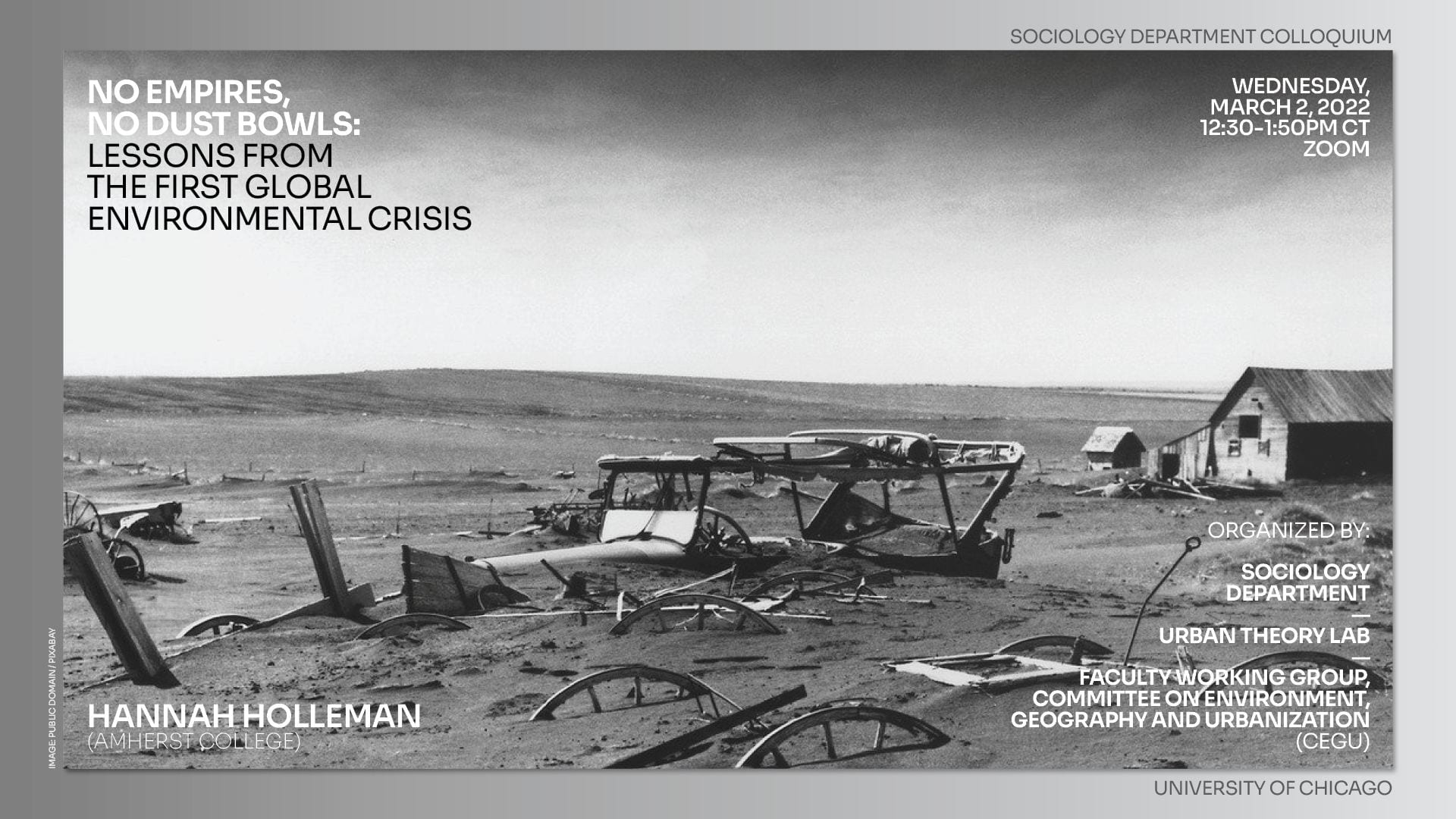
Co-sponsored Event
No Empires, No Dust Bowls: Lessons from the First Global Environmental Crisis
Hannah Holleman, Amherst College
Wednesday, March 2, 2022, 12:30–1:50pm CT
Zoom
More Info
Organized by the Department of Sociology; co-sponsored by CEGU
Energy Histories & Geographies
Thea Riofrancos, Providence College
Julie Klinger, University of Delaware
Ryan Cecil Jobson, University of Chicago (moderator)
Thursday, February 24, 2022, 4:30–6:00pm CT
Zoom
Climate & the Legacies of Empire
Sunil Amrith, Yale University
Keston Perry, Williams College
Elizabeth Chatterjee, University of Chicago (moderator)
Thursday, February 10, 2022, 4:30–6:00pm CT
Zoom



